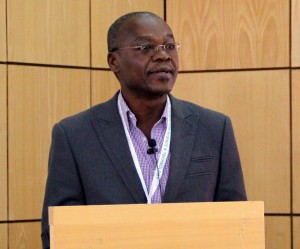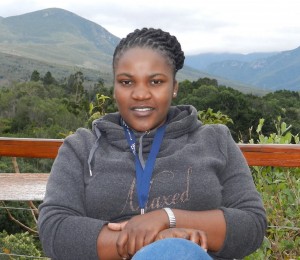IUFRO fosters discussions on respective needs and benefits at a number of side events during the XIV World Forestry Congress in September in Durban, South Africa.
http://www.iufro.org/events/other-major-events/wfc-2015/
Climate change, food and water security, biodiversity conservation, and reliable, clean energy are some of the global challenges society is facing today. All have in common that they are highly interconnected and that they are all related to forests and forest management in some ways. Therefore our sustainable development will highly depend on how we manage and use forests in future and how we include forests in meeting the big challenges ahead.
In order to come up with effective responses, a deep scientific understanding of the issues and their interconnectivity is one premise. Other premises are the dissemination and application of this knowledge. Knowledge generation, capacity building and education in forestry are key means to help developing our society sustainably and responsibly both at the local and global levels.
For IUFRO, the XIV World Forestry Congress, hosted by the Republic of South Africa and organized by the FAO Forestry Department, will be the ideal platform to bring these topics to the attention of the global forestry community effectively. The XIV World Forestry Congress is expected to be one of the largest forestry events of this decade: http://www.fao.org/about/meetings/world-forestry-congress/en/
At the WFC, IUFRO will hold a side event on “Global Forest Science Cooperation” on 9 September, 18:15 – 19:30 hours, hall 1A (open to all Congress participants).
Among other things, this event principally aims at discussing framework conditions and investment in research, education and capacity development that are required to achieve impact on policies and practices promoting forest sustainability at all levels. It will also elaborate on the role of networking as means of generating, synthesizing and disseminating scientific knowledge.
“Knowledge societies will have to be societies of shared knowledge”, stated the first UNESCO World Report1 in 2005: “Networking helps to open up entire realms of knowledge, such as scientific and technological knowledge, that until now were often jealously guarded for strategic or military reasons.” Today’s global challenges require responses that are well-grounded on shared scientific knowledge, across various research areas and with input from different regions of the world. At the same time, networking cooperation is a cost-effective way of how to create and share scientific knowledge.
“Towards knowledge societies”, UNESCO World Report, 2005: http://www.unesco.org/new/en/communication-and-information/resources/publications-and-communication-materials/publications/full-list/towards-knowledge-societies-unesco-world-report/
IUFRO President Mike Wingfield, FABI, South Africa:
“Interconnecting forests, science and people, this is the theme of the IUFRO Strategy for the coming years. We aim to promote research excellence around the globe and effectively share the latest scientific evidence on key policy issues. We will bring people together to address the complex natural resource challenges that are facing our planet.”
As an example, the IUFRO-led Global Forest Expert Panels Initiative (GFEP) just recently presented the most comprehensive scientific analysis to date on the relationship among forests, food and nutrition. More than 60 renowned scientists from around the world collaborated on the peer-reviewed publication “Forests, Trees and Landscapes for Food Security and Nutrition. A Global Assessment Report”, which was coordinated by IUFRO, the world’s largest network of forest scientists, on behalf of the Collaborative Partnership on Forests (CPF). The study came in the lead up to the United Nations’ finalization of the Sustainable Development Goals, designed to address, among other global challenges, poverty and hunger.
Another example is IUFRO’s project on “Reducing Deforestation and Forest Degradation in Central and West Africa”. In many African countries there is a strong connection between forest degradation and the inability by decision-makers and society at large to access existing scientific knowledge and innovations that could aid in reversing the numerable negative effects of forest degradation. In an attempt to address this issue, IUFRO and its partner institutions in the four African countries of Cameroon, Ghana, Liberia, and Nigeria, supported by ITTO (through the “REDDES – Reducing deforestation and forest degradation and enhancing environmental services from forests” programme), established a project to propagate and disseminate forest-related scientific information.
Knowledge generation and its dissemination highly depend on skilled experts. However there are knowledge and skill divides across the world, often occurring between developed and less developed countries, but also within societies. Capacity building is key to address these divides.
In order to strengthen capacity building and to bring knowledge and implementation tools to those from less-favoured regions in terms of higher education or research programs, IUFRO’s Special Programme for Development of Capacities (SPDC) in collaboration with the World Resources Institute is organizing a workshop in the run-up to the World Forestry Congress. The training workshop on science-policy interactions for forest and land-scape restoration (4-6 September 2015) aims to train on what is needed at local levels to implement forest and landscape restoration, and it discusses ways and means of transforming scientific knowledge into useful information for policy and management decisions on the ground (closed group of participants).
There are already good examples for well-established regional scientific networks in Africa, such as the Forestry Research Network of Sub-Saharan Africa (FORNESSA). The International Tropical Timber Organization (ITTO) supports the initiative, and the first IUFRO/FORNESSA regional Congress in Africa was held in Nairobi, Kenya in 2012.
Ernest Foli, Forest Research Network of Sub-Saharan Africa (FORNESSA), Ghana, coordinator of the REDDES project on behalf of IUFRO and trainer at the pre-Congress training workshop in Durban:
“Knowledge alone will not lead to successful landscape transformation. However, the REDDES project clearly shows the useful role of research institutions to lead and/or facilitate multi-stakeholder processes. And it also improved professional networking among the four countries, which is another positive step.”
However, to promote tomorrow’s experts on forests and forest management, there is also an urgent need to enhance forestry education with main emphasis in those parts of the world where educational institutions are lacking. The side event “Enhancing Forestry Education in Africa” (8 September, 19:45 – 21:00 hours, room 21ABC), that will be held by the International Forestry Students’ Association (IFSA) in cooperation with IUFRO aims at reviewing the current state of forestry education in Africa. It particularly addresses students and professionals to come together and discuss respective needs and opportunities. Participants of the panel include representatives from FAO, IUFRO, SAIF, IFSA, local forestry students in Africa and two South African universities.
Discussions will also reflect on outcomes of a pre-side event workshop on forestry education in Africa (6 September, 9:30 – 12:30 hours, room 11CDE). The Workshop will concentrate on the analysis of the situation of forestry education in Africa and is aiming at identifying main gaps and challenges with active participation of both African and international students.
Tatenda Mapeto, PhD Student (Forest Hydrology) at the Nelson Mandela Metropolitan University, South Africa, and Head of Forestry Education Commission in the International Forestry Students Association:
“The range and diversity of forest ecosystems in Africa is broad and sustainable management of these forests has always been on the agenda. However, a plethora of environmental challenges in the Anthropocene calls for understanding the extent of and the linkages in diversity as well as education systems that catapult enabling environments for knowledge generation, capacity building, crossing conventional literacy barriers and affording inclusiveness.”
Investing in knowledge generation, capacity building and education in forestry must rather be seen as an absolute necessity than as a question in order to enable our society to respond to the great challenges of this century. With its various events at the World Forestry Congress, IUFRO would like to contribute to improving conditions and terms and finding innovative approaches to implement these issues.
We encourage you to participate in these events and get involved in the discussions!
Find details of IUFRO events XIV WFC 2015 here:
http://www.iufro.org/events/other-major-events/wfc-2015/




Leave a Reply